
Claim: All emails related to the Democratic National Committee (DNC) leak have been removed from WikiLeaks as part of Julian Assange’s plea deal.
Fact: WikiLeaks has struggled with server errors for years. It has not recently occurred as part of a plea deal. Emails related to the DNC can still be accessed through the website.
On 26 June 2024, X (formerly Twitter) user “Mario Nawfal” posted a split photo of Julian Assange and US President Joe Biden with the caption:
“BREAKING: ALL EMAILS RELATED TO THE DNC LEAK HAVE BEEN REMOVED FROM WIKILEAKS
Following Julian Assange’s guilty plea to unlawfully obtaining and disclosing classified documents related to national defence, WikiLeaks has removed all DNC emails from its platform; all emails appear with an Internal Server Error Message.
As part of the plea deal, Assange must ensure the return or destruction of unpublished information held by him or WikiLeaks and provide a sworn affidavit confirming compliance, effectively limiting his legal exposure and potentially curtailing future leaks.
Sources: NY Times, NBC News,
@wikileaks”
Julian Assange Indictment
WikiLeaks is a whistleblower organisation founded in 2006 by Australian hacker, Julian Assange. According to its website, WikiLeaks is, “a multi-national media organization and associated library. It was founded by its publisher Julian Assange in 2006. WikiLeaks specializes in the analysis and publication of large datasets of censored or otherwise restricted official materials involving war, spying and corruption. It has so far published more than 10 million documents and associated analyses.”
The website has leaked several highly classified documents in the name of press freedom including over 90,000 military reports detailing the US invasion and military action in Afghanistan, and over 40,000 reports discussing US actions in Iraq. It also leaked hundreds of files related to the treatment of Guantanamo detainees, as well as thousands of diplomatic cables between the US and other countries. The leaks led to intense global scrutiny over US military actions around the world. But the US government took issue with the leaks “as they had endangered the lives of American personnel,” and violated national security, according to the BBC.
In response to these leaks in 2010 the Justice Department opened an investigation into WikiLeaks and began exploring the idea of charging Assange under the Espionage Act of 1917. The First Amendment Center notes the Act was passed right before World War 1 as wartime protection and that it “prohibits obtaining information, recording pictures, or copying descriptions of any information relating to the national defense with intent or reason to believe that the information may be used for the injury of the United States or to the advantage of any foreign nation.”
During the 2016 US presidential election, WikiLeaks again leaked damaging documents namely an archive of the DNC’s emails which demonstrated an internal bias the organization displayed against presidential candidate Bernie Sanders, and their preference for presidential candidate and rival Hillary Clinton. The leak caused a massive fallout culminating in the resignation of the chair of the Democratic National Committee, Debbie Wasserman Schultz.
In May 2019 The New York Times reported (archive) that Assange was indicted under the Espionage Act for, “his role in obtaining and publishing secret military and diplomatic documents in 2010.” Significantly these new charges were part of an indictment obtained by the Trump administration, and were not related to the 2016 DNC email leak or Hillary Clinton’s email leak, an act that former FBI director Robert Mueller concluded was likely protected by the First Amendment.

Image Note: Excerpt from Mueller’s report
As reported, it had to do with, “Mr. Assange’s role in the leak of hundreds of thousands of State Department cables and military files by the former Army intelligence analyst Chelsea Manning.” Assange’s indictment under the Espionage Act stirred controversy for its perceived infringement of press freedoms and the First Amendment.
On 26 June 2024, Assange entered a plea deal with the Department of Justice in which he pleaded guilty to espionage charges, but would not be required to spend any time in American prisons and instead could travel home to Australia.
Fact or Fiction?
To investigate this claim Soch Fact Check first conducted a keyword search but found no mainstream news outlet had reported on the claim that part of the plea deal mentions removing the DNC email cache. We then specifically searched The New York Times and NBC News which were cited as sources for this claim. However, neither news outlet has put out any reports regarding this claim.
The tweet also cited the WikiLeaks X handle as a source. Soch Fact Check scoured the account for information related to the claim but found nothing significant. The handle did however recently share an article by The Dissenter, captioning it, “Assange stated in court that he committed journalism – inside the plea deal”.
The article, officially cited by WikiLeaks, details the parameters of the plea deal, two aspects of which are significant to this claim. The first is that as part of the plea deal, the Justice Department agreed not to charge Assange for any of his conduct before the plea deal, according to the article. His lawyer Barry Pollack was quoted in the piece as saying, “agreed that they would not bring any other charges against Julian for any conduct, any publications, any newsgathering, anything at all that occurred prior to the time of the plea”. This means that Assange cannot be charged for the leaks of the DNC emails.

Secondly, the article notes that as part of the plea deal Assange agreed to, “take all action within his control to cause the return to the United States or the destruction of any such unpublished information in his possession, custody, or control, or that of WikiLeaks or any affiliate of WikiLeaks.”

Importantly this agreement by Assange relates to unpublished works. This means that any published works by WikiLeaks, in this case, the DNC emails, will remain available on the website. The official transcript of the plea deal notes these parameters as well.
There is some truth to the claim in that WikiLeaks often produces an internal server error message when trying to access its archives. But this issue has been noted for years, it is not specific to the plea deal. In November 2022 The Daily Dot reported that the website was struggling, headlining the piece, “WikiLeaks website is struggling to stay online—as millions of documents disappear.” The article noted that WikiLeaks which functions off donations was fundraising for Assange’s legal defence and that, “it appears none of those funds go to website maintenance.” It observed that while the website boasts of having leaked over 10 million documents, at the time only 3000 documents were accessible. The DNC email archive was included in the list of affected and inaccessible archives. This was also reported by Wired and Gizmodo.
This was not the first time The Daily Dot noted server issues on WikiLeaks.
In February 2022 the publication observed that the newly launched submissions portal on WikiLeaks was not functional, adding that, “an address provided for submitting content to WikiLeaks’ through its onion service, a domain on the dark web that allows users to send documents anonymously, appears to be offline when clicked.”
In July 2022 The Daily Dot again reported that the submissions portal was still not working stating, “The Daily Dot made multiple attempts to upload some of WikiLeaks’ own documents and encountered numerous errors. The system would either not respond at all or the upload status indicator would freeze at 93% and never complete, making it appear as if uploading documents wasn’t even possible.”
Additionally, Wayback Machine, an Internet archiving site that aims to build a digital library of Internet sites and other cultural artefacts in digital form, tracked the frequency of server error messages on WikiLeaks through the years. Notably, the error messages started in 2022 and have increased in frequency since.
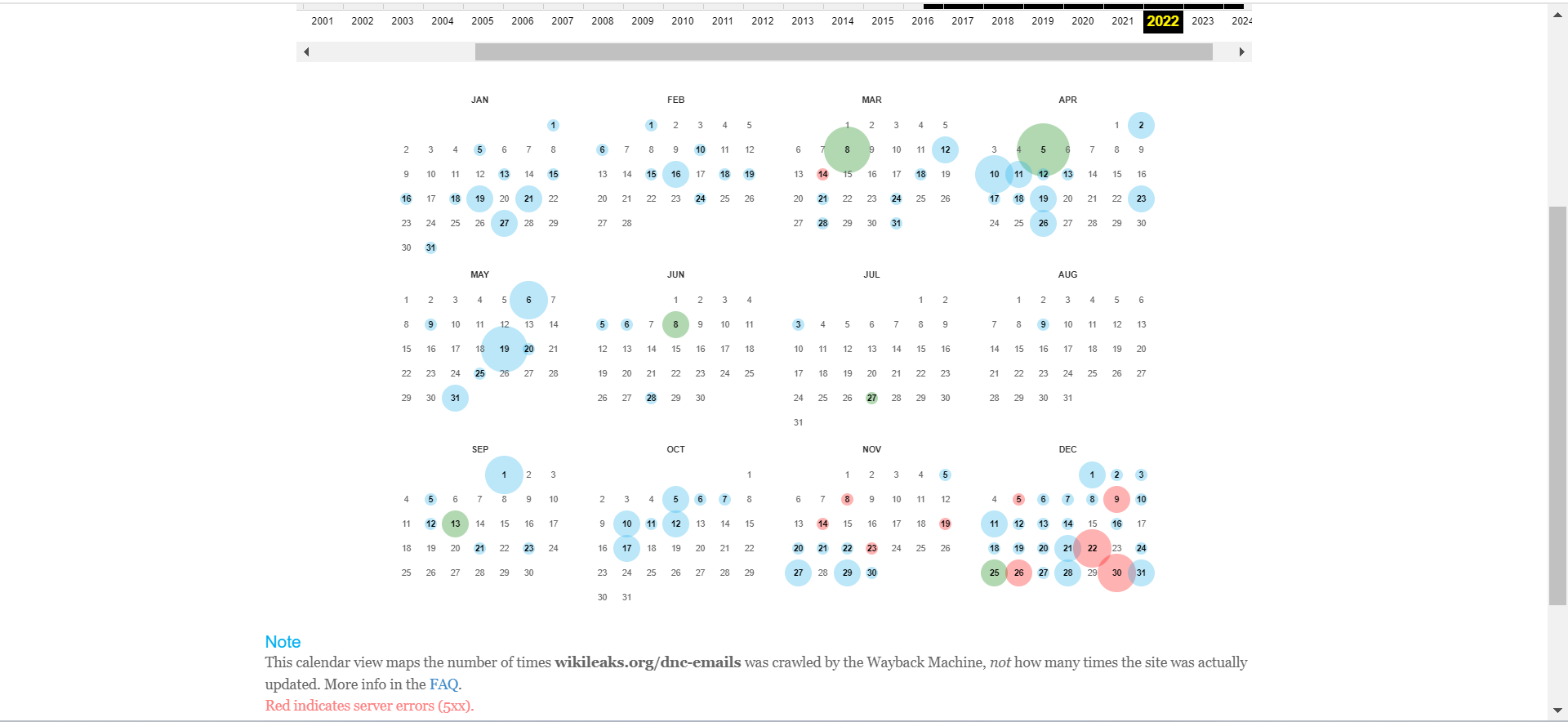
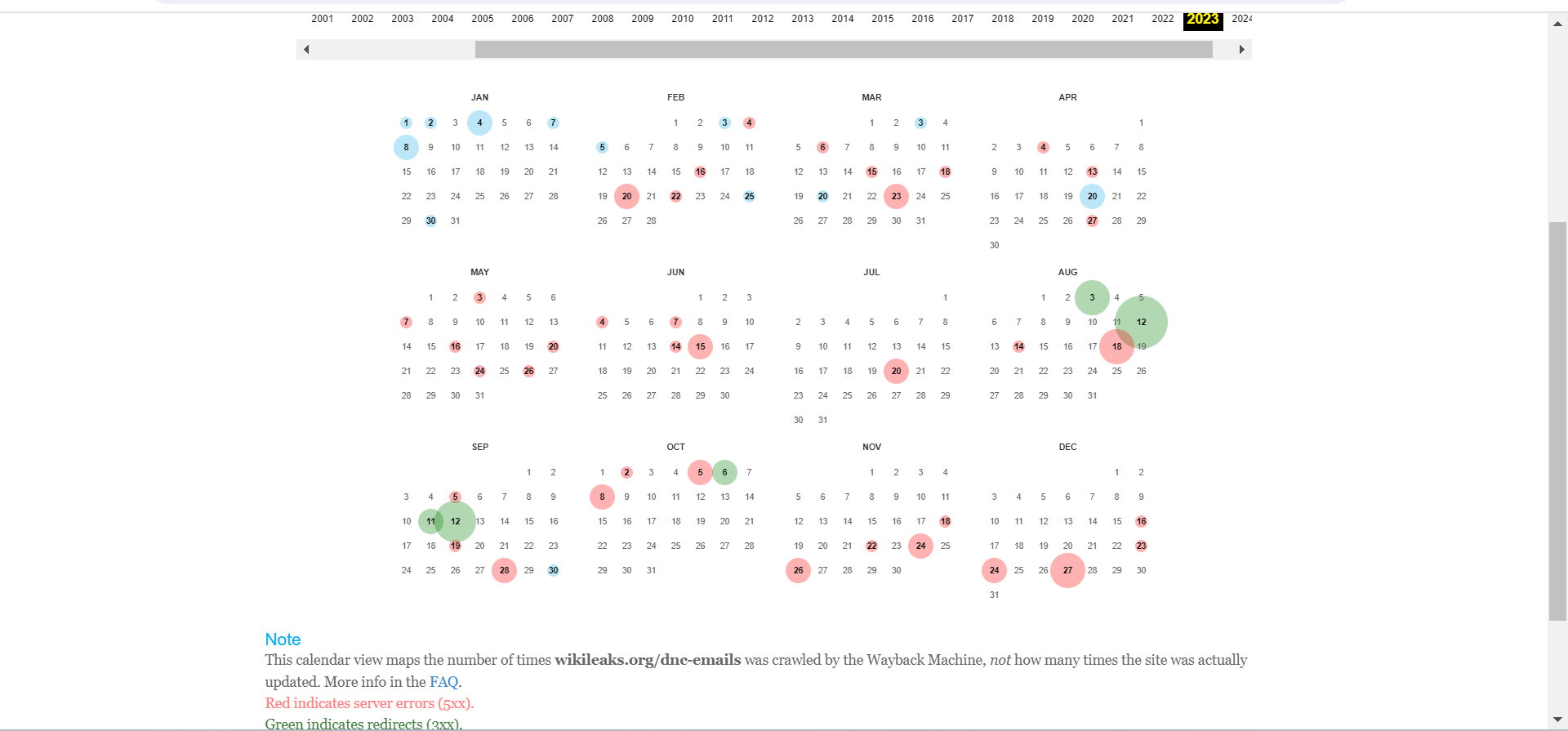
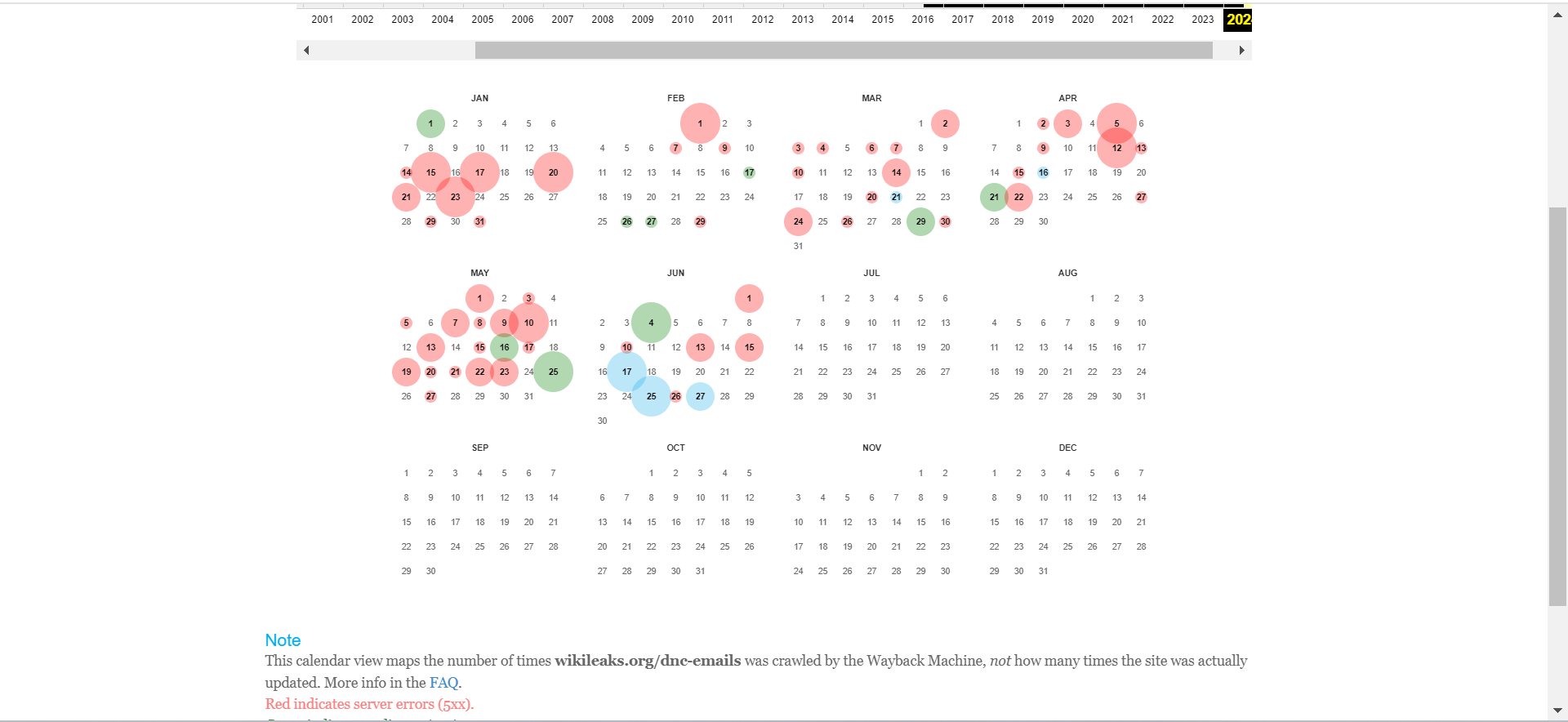
To further test this Soch Fact Check searched the DNC email archives on WikiLeaks and tried to open the most controversial emails. One email by DNC National Secretary Mark Paustenbach discusses how to undermine Bernie Sanders’s campaign writing, “Wondering if there’s a good Bernie narrative for a story which is that Bernie never ever had his act together, that his campaign was a mess”. It was listed by ABC News as one of, “The 4 Most Damaging Emails From the DNC WikiLeaks Dump”. When we first attempted to open the email we encountered no server error and were able to view the email in question as seen here in these screenshots:
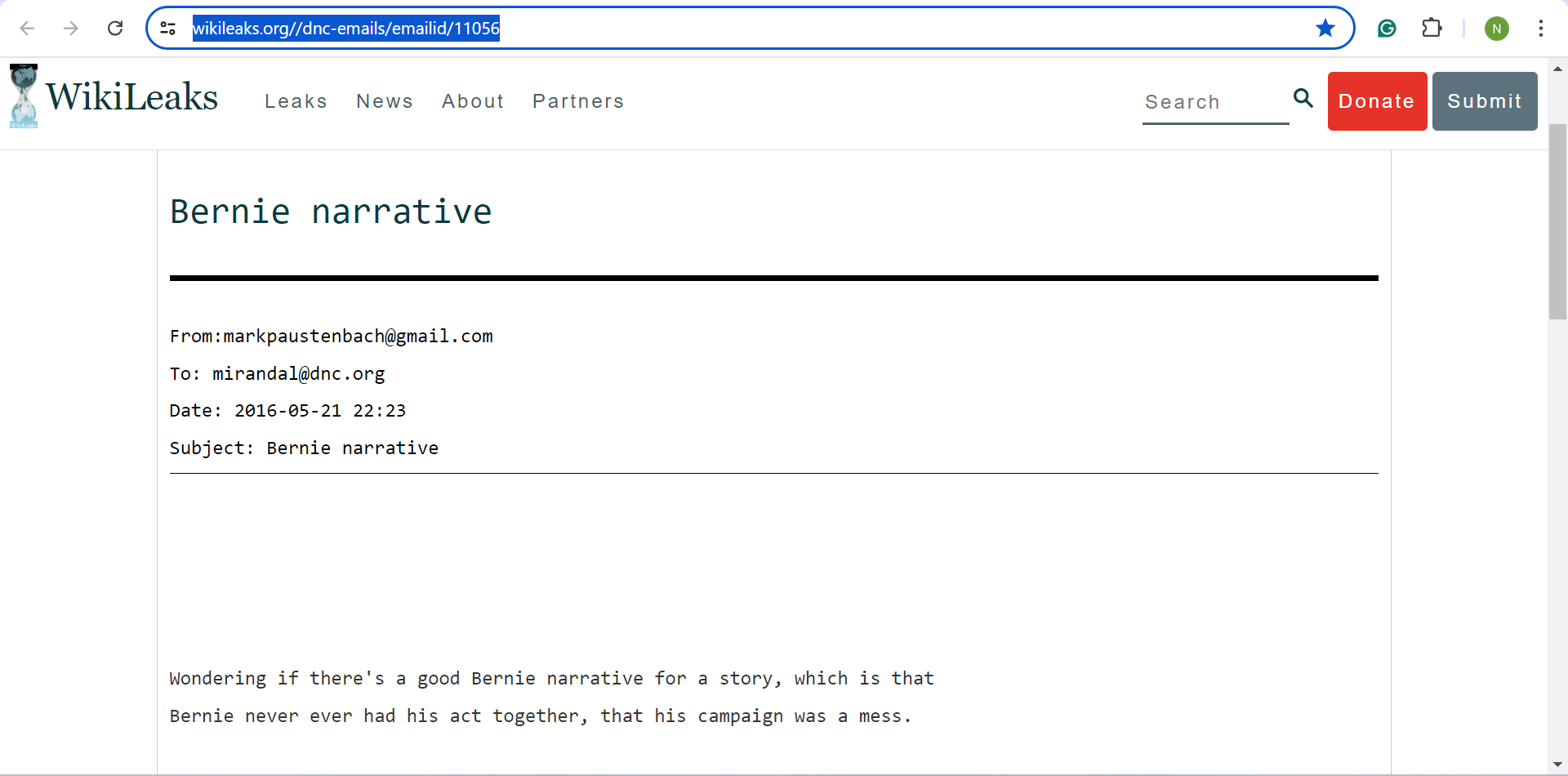
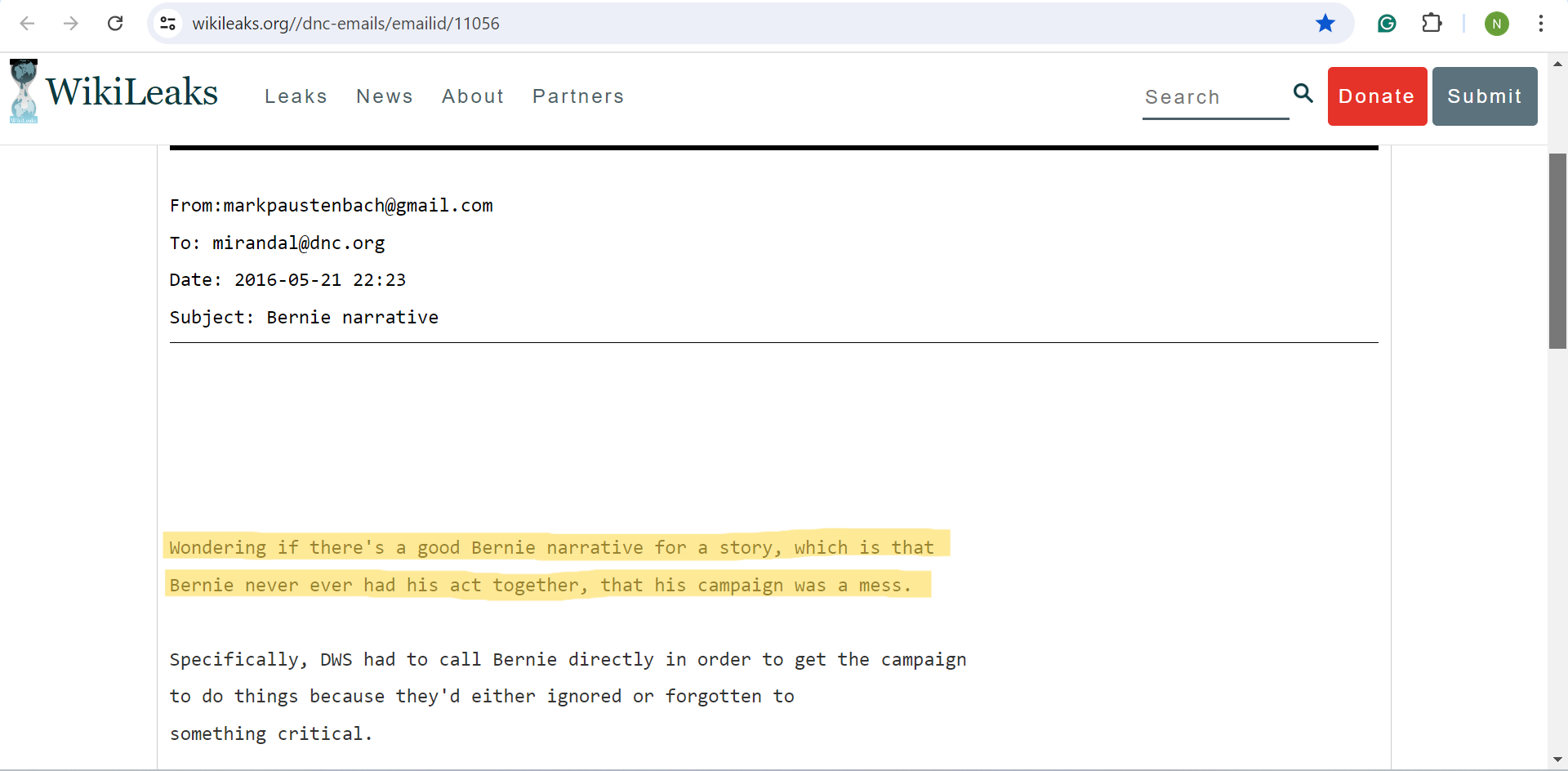
Later on the same day, we attempted to access this very email once again, as evidenced by the URL remaining “https://wikileaks.org//dnc-emails/emailid/11056” but encountered a server error message:
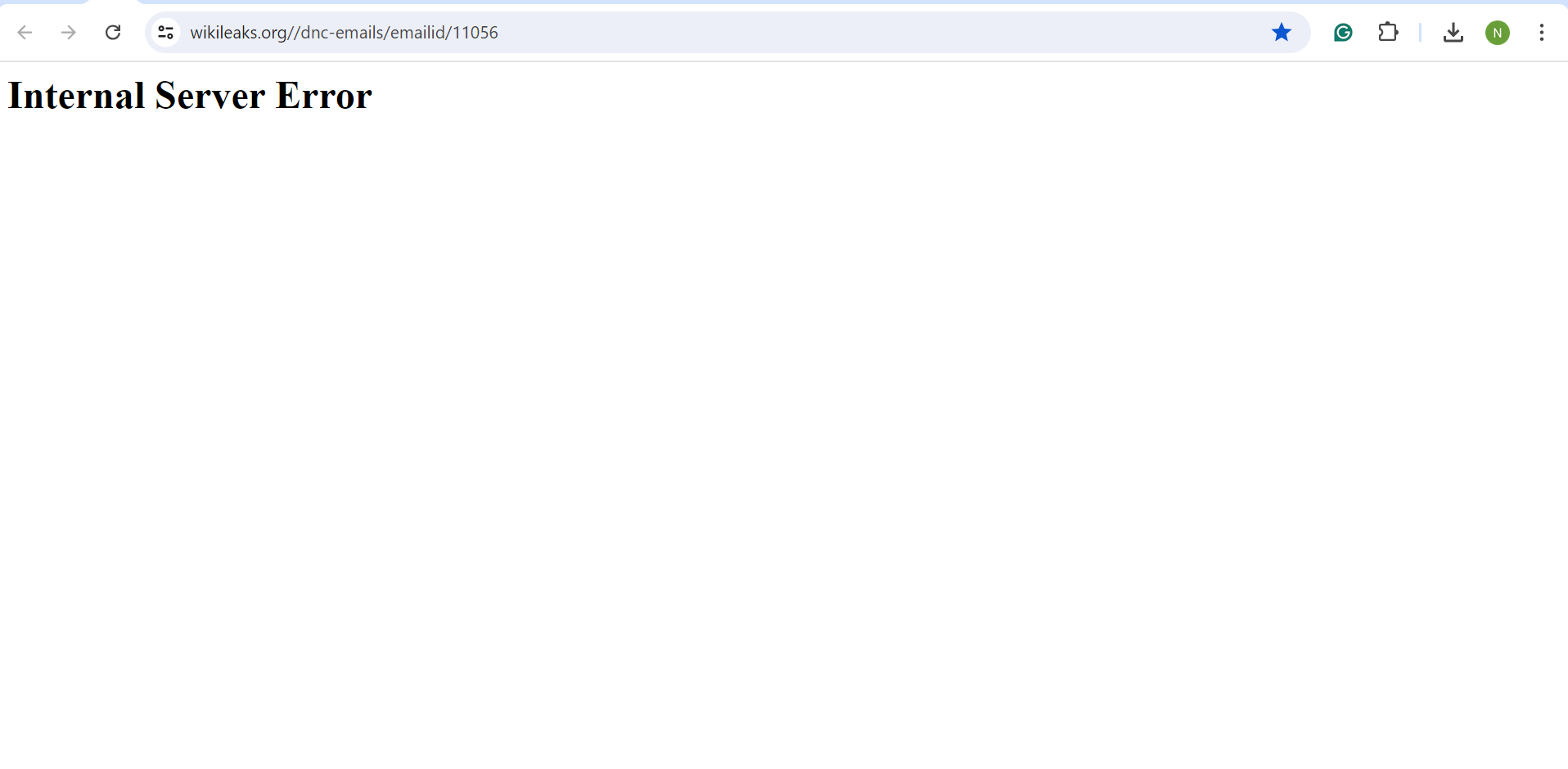
This confirmed that the “Internal Server Error” is not due to the removal of pages as part of the plea deal, but because of technical issues the website has suffered from for the past few years.
Therefore, Soch Fact Check concludes that the claim is false.
Virality
Soch Fact Check found that the same claim had been shared on Facebook here, here, and here.
Mario Nawfal’s X post also garnered over 2 million views.
Conclusion: The viral claim that WikiLeaks removed the 2016 DNC emails archive from its website as part of Julian Assange’s plea deal, is false. Assange’s case was related to the 2010 leaks regarding US military activity and had nothing to do with the 2016 leaks. The server errors are part of ongoing technical issues the site has been suffering from since at least 2022.
To appeal against our fact-check, please send an email to appeals@sochfactcheck.com
